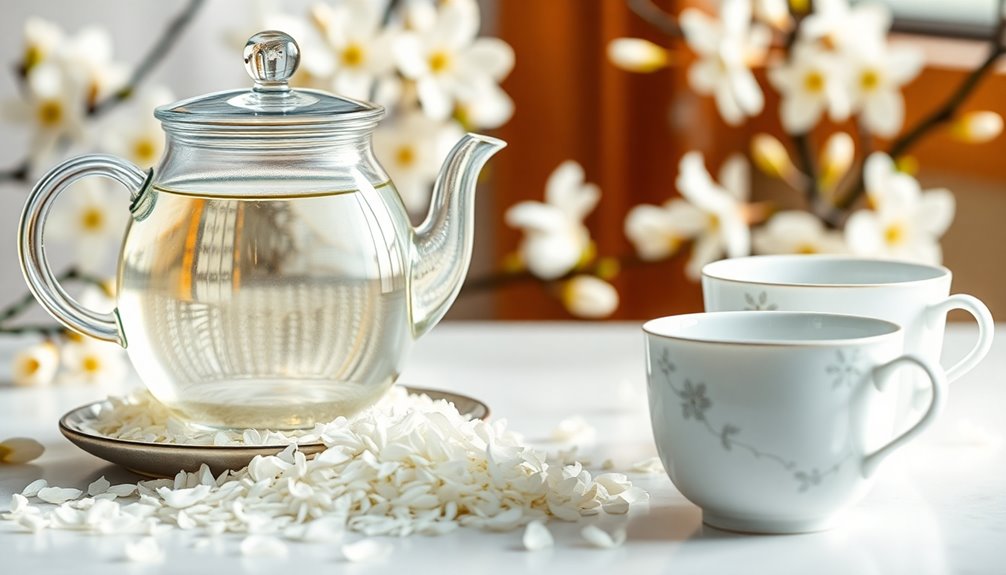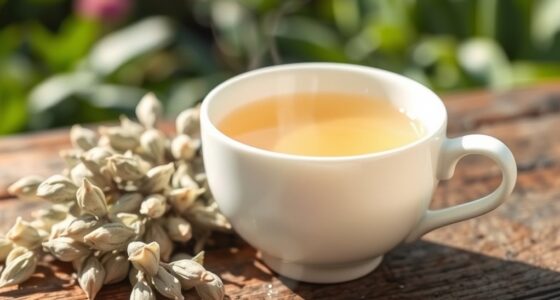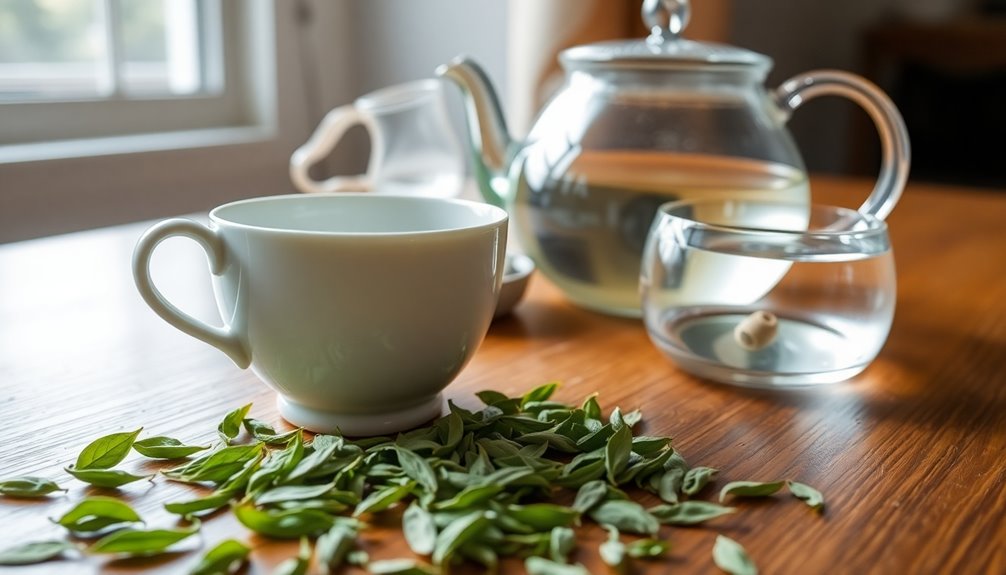White tea is perfect for relaxation and stress relief because it's gentle on your system, with low caffeine levels that won't keep you awake. It contains L-theanine, a calming compound that helps reduce anxiety and lowers cortisol levels, which are tied to stress. The delicate flavor and soothing aroma make it enjoyable, too! Plus, the natural polyphenols in white tea boost your mood and improve focus. Enjoying a cup can encourage mindfulness and tranquility in your day. If you're curious about more benefits and ways to enjoy this delightful tea, there's plenty more to discover!
Key Takeaways
- White tea has low caffeine content, promoting relaxation without causing jitters and is suitable for evening consumption.
- It contains L-theanine, which reduces anxiety, lowers cortisol levels, and enhances mental clarity for better stress management.
- Rich in natural polyphenols, white tea acts as an antioxidant, combating oxidative stress and supporting emotional regulation.
- The delicate flavor and soothing aroma of white tea encourage mindfulness practices, fostering a tranquil state of mind.
- Regular consumption of white tea can improve mood and enhance overall well-being, making it an ideal choice for stress relief.
Introduction
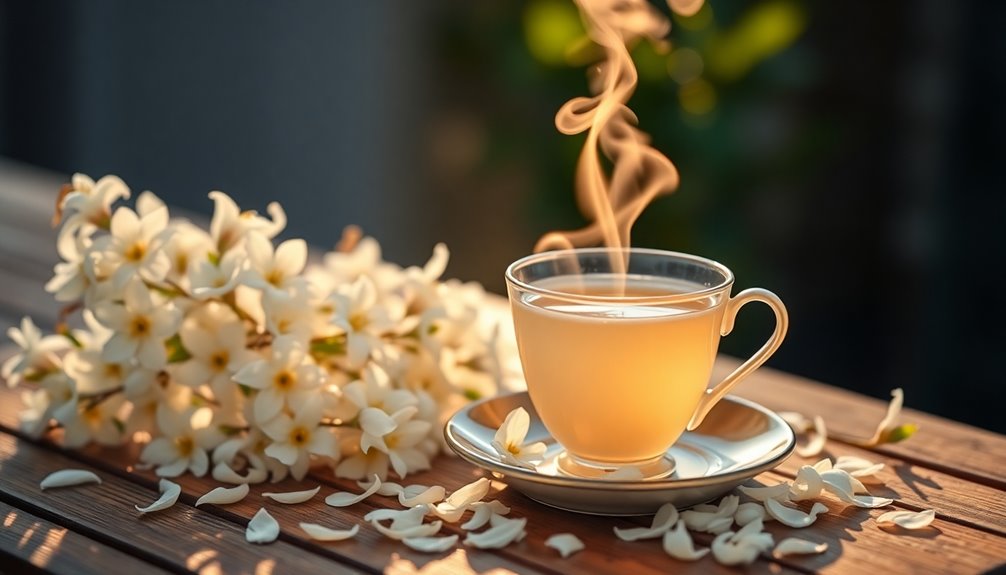
When you're looking for a way to unwind, white tea might just be the perfect companion. With its delicate flavor and soothing aromatic qualities, it's designed to help you relax. Unlike stronger teas or coffee, white tea has low caffeine, which means it won't give you the jitters. Instead, it promotes relaxation without making you feel wired.
One of the best parts of white tea is its L-theanine content. This special amino acid helps reduce anxiety and stress levels. If you're in a high-pressure environment, sipping white tea can be a great way to find calm. Regularly drinking white tea can even lower cortisol levels, the hormone linked to stress, leading to a more tranquil state of mind.
In many Asian cultures, drinking tea is a mindful practice. It encourages you to pause and reflect, making the experience even more relaxing.
Origin of White Tea
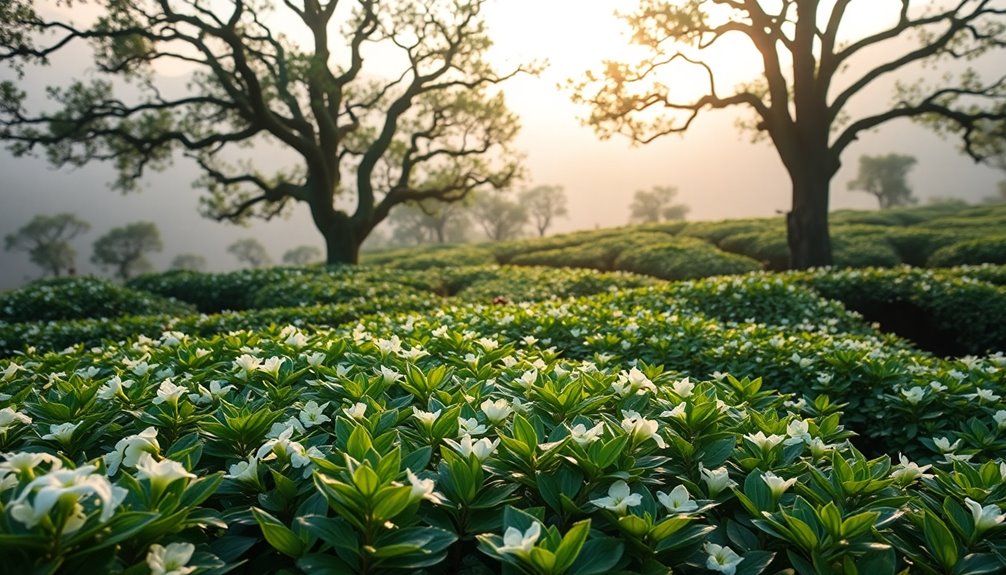
White tea has a rich history that dates back about 5,000 years to its origins in China, where it's believed that the legendary Emperor Shen Nong discovered its remarkable health benefits.
This special tea comes from the Camellia sinensis plant, which has fine white hairs on its buds. These buds are carefully harvested before they bloom, ensuring the highest quality.
The earliest recorded production of white tea began in the Fujian province during the 1700s. It quickly became known as a luxury beverage, cherished by the upper classes.
During the Song and Ming Dynasties, white tea was part of the Imperial Tea Tribute system, reserved only for royalty. This exclusivity made it a symbol of status and elegance.
As time passed, more people learned about its health benefits and unique flavor.
Today, white tea has gained popularity worldwide, expanding beyond its Asian roots. You can now find it in shops and cafes, inviting you to enjoy a taste of its fascinating history.
Rich in L-theanine
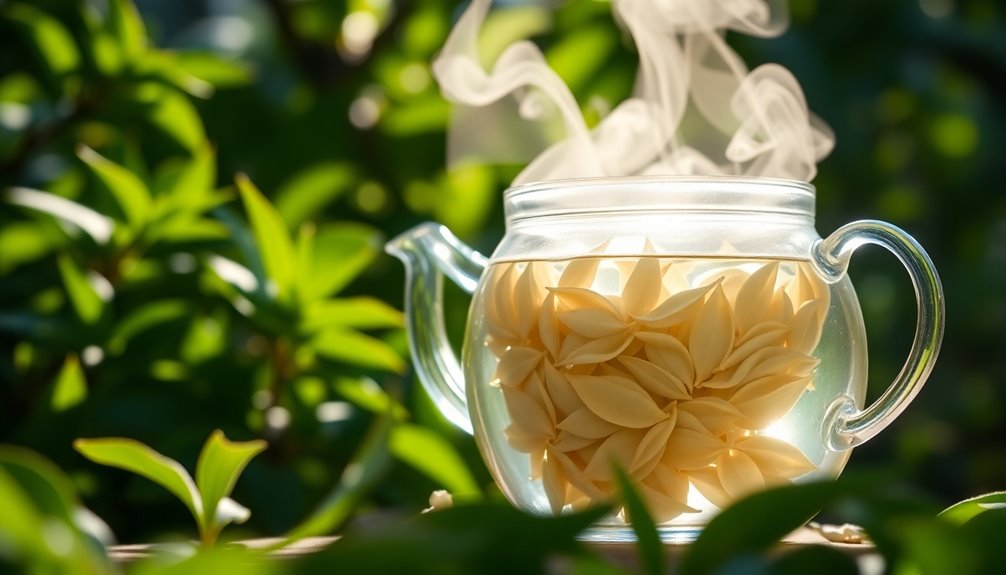
The journey of white tea from its royal origins leads us to one of its most valued components: L-theanine. This special amino acid is known for its ability to promote relaxation and stress relief without making you drowsy.
When you sip white tea, L-theanine helps enhance alpha brain wave activity, which can lead to improved mental clarity while keeping you calm.
Studies show that L-theanine can lower cortisol levels, the hormone linked to stress. By reducing cortisol, it helps ease anxiety and creates a peaceful state of mind.
Regularly drinking white tea rich in L-theanine can lead to mood improvement, especially in high-pressure situations.
Additionally, the combination of L-theanine with green tea's calming properties can enhance the overall relaxation experience.
If you're looking for a way to incorporate mindfulness into your day, white tea is an excellent choice. Its calming effects make it perfect for relaxation activities, helping you find tranquility amid chaos.
Whether you're studying, meditating, or just taking a break, a cup of white tea can be your go-to beverage for achieving that desired calmness.
Rich in Natural Polyphenols
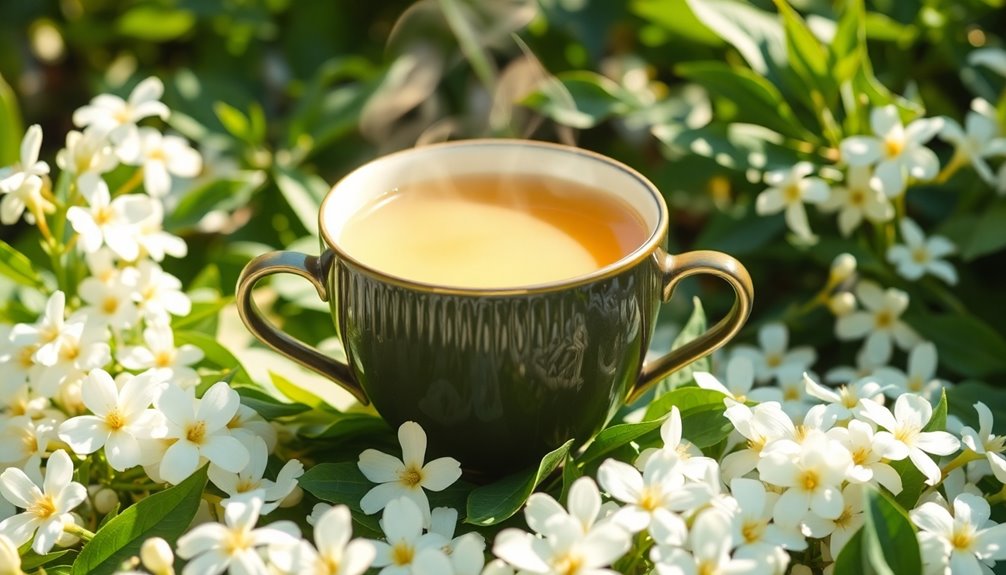
Rich in natural polyphenols, white tea offers a treasure trove of health benefits that go beyond its delightful flavor. These powerful compounds, especially catechins, are packed with antioxidants that help fight oxidative stress in your body. When you enjoy a cup of white tea, you're not just treating your taste buds; you're also supporting your overall well-being.
The polyphenols in white tea can help regulate mood by influencing neurotransmitters like serotonin and dopamine. This means you might feel a sense of calm and relaxation, which is perfect for easing anxiety.
Plus, regular consumption of this tea has been linked to lower cortisol levels, the stress hormone known for making you feel overwhelmed.
White tea's polyphenols also enhance blood flow and reduce inflammation, promoting even more relaxation. When your body feels good, your mind follows suit.
Studies show that these antioxidants can boost mental clarity and cognitive function, aiding in effective stress management. So, when you're looking for a soothing ritual, turn to white tea. Not only does it taste great, but it's also a simple way to support your mental clarity and well-being!
Caffeine Content Variations
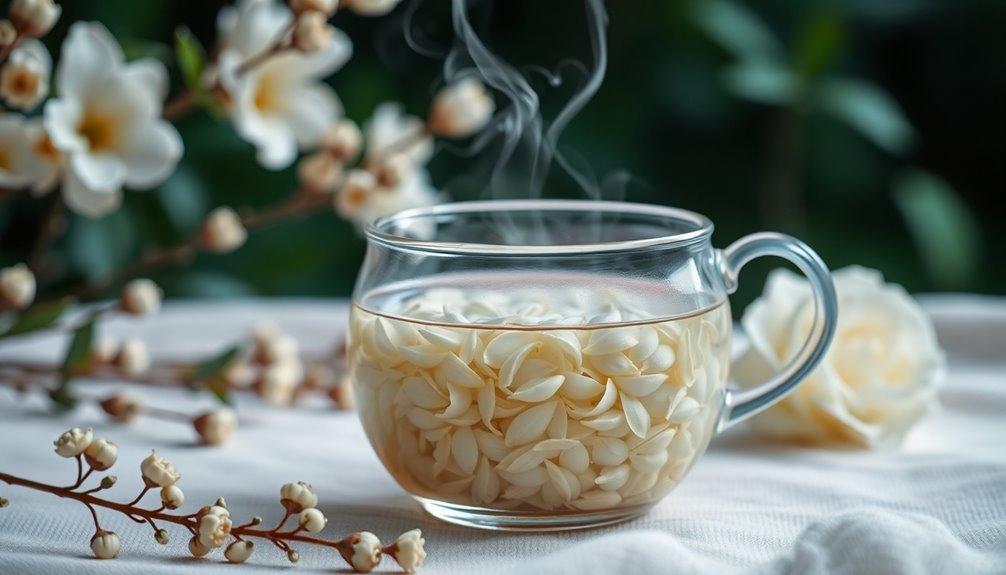
With its calming effects, white tea stands out not just for its flavor and polyphenol content, but also for its lower caffeine levels. Typically, white tea has around 15-30 mg of caffeine per 8 oz, which is much less than black or green tea. This lower caffeine content makes white tea a great choice if you're sensitive to caffeine or looking for relaxation without the jitters.
Because of its reduced caffeine levels, white tea is perfect for evening consumption. You can enjoy a soothing cup before bed without worrying about disrupting your sleep patterns.
Plus, white tea contains L-theanine, an amino acid that works with its lower caffeine to enhance relaxation and mental well-being. Regularly sipping white tea can give you a gentle energy boost while minimizing anxiety. It helps you feel calm and collected throughout the day, making it a wonderful option for stress relief. Additionally, white tea is rich in antioxidants that can contribute to overall health and wellness.
Practical Applications

Incorporating white tea into your daily routine can transform your approach to relaxation and stress management. This delightful beverage is packed with L-theanine, which promotes relaxation and helps reduce anxiety—perfect for stress relief. By sipping white tea regularly, you can lower your cortisol levels, the hormone linked to stress, enhancing your overall mental well-being.
Make drinking white tea a calming ritual in your day. Whether you enjoy it in the morning or during a break, take a moment to practice mindfulness. Focus on the warmth of the cup and the soothing aroma, allowing yourself to unwind amidst the chaos.
With its lower caffeine content, white tea gives you gentle energy, helping you stay focused without the jitters of stronger drinks.
Additionally, incorporating white tea into your evening routine can improve sleep quality. It promotes relaxation and reduces stress, contributing to a restful night's sleep.
Frequently Asked Questions
Does White Tea Reduce Stress?
Yes, white tea can reduce stress. It contains L-theanine, which promotes relaxation, and its antioxidants combat oxidative stress. Plus, its gentle caffeine boost helps you stay calm and focused without the jitters.
What Tea Is the Most Calming?
When you're seeking a calming tea, consider white tea. Its low caffeine and presence of L-theanine help you relax without jitters, making it an excellent choice for unwinding after a long day. Enjoy its delicate flavor!
Why Does White Tea Make Me Sleepy?
White tea makes you sleepy due to its low caffeine content and presence of L-theanine, which promotes relaxation. Its soothing flavor creates a calming ritual, helping your body unwind and prepare for restful sleep.
Does White Tea Have L-Theanine in It?
Yes, white tea does contain L-theanine. This amino acid helps promote relaxation and reduces anxiety without making you sleepy. You'll find it enhances your focus and attention while providing a calming, balanced effect.
Conclusion
In conclusion, white tea is a fantastic choice for relaxation and stress relief. Its unique combination of L-theanine and natural polyphenols helps calm your mind and body. Plus, with lower caffeine levels, you can enjoy it any time of day without feeling jittery. So, the next time you need a moment to unwind, brew yourself a cup of white tea. You'll be treating yourself to a soothing experience that supports your well-being!



